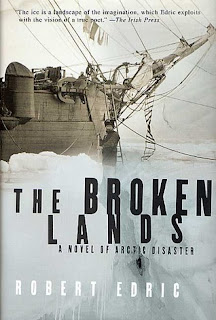0312288891
Thomas Dunne/St. Martin's Press,1992
first US edition, 2002
hardcover
369 pp
"She's seen us coming, opened a door for us and then slammed it tight shut behind us."
The US edition of this book came out in 2002, so it has been sitting on my shelf for the last sixteen years, and it's another one I'm kicking myself for not reading sooner. In The Broken Lands, as the dustjacket blurb says, the author has chosen as his subject the 1845-1848 Franklin mission to discover the Northwest Passage and "re-creates what may have happened to this doomed expedition."
 |
| from The Conversation |
To this day nobody really knows what happened to the men who sailed with Franklin on HMS Terror and HMS Erebus. Along with important scientific discoveries, there has also been a lot of speculation and theorizing, but despite everything that's been discovered since this book was first published (including the discovery of the two ships in the Canadian Arctic), the mystery remains. Truth be told, I love a mystery, and it's that sense of the unknown that has drawn me to anything written about the Franklin Expedition, fiction or nonfiction. The author has given us what I feel is a plausible story here, and his research is highlighted throughout this book in which he incorporates the historical facts into his account, which begins and ends with James Fitzjames of the Erebus It is largely through his eyes that the story unfolds.
As the dustjacket blurb reminds us, "The Broken Lands" is "a treacherous labyrinth of ice through which the fabled Northwest Passage was sought for centuries." The book is not unexpectedly bleak, with the men eventually succumbing one by one to their long ordeal. While the expedition starts on a high note with hurrahs and hopes for success, as time goes by the mission becomes one of survival and desperation. While there are ongoing mentions of possible human causes contributing to this disaster, in the end it comes down to the ice as the true master of them all. As Harry Goodsir, the assistant physician and scientist notes:
"We pin our hopes on brute strength and ingenuity and whereas the latter might be the most admirable and readily acknowledged of our qualities, deep down we are convinced that without the former it is all to no avail...Look around you. What have we done but pitted our strength against the ice, barging and blasting our way into this miserable dead-end? where is the ingenuity of that?"Or, even more fittingly, while ice masters Reid and Blanky set out in late August to assess the nature of the ice and to seek out possibilities of a lead by which the ships might escape, Blanky realizes exactly what they're up against:
"Nine summers out of ten we wouldn't have come halfway from Barrow Strait to get here...She's seen us coming, opened a door for us and then slammed it tight shut behind us."I see that several readers weren't as fond of this book as I was, and that's okay. A lot of people found the first chapter of the book a bit boring, but I saw a lot of foreshadowing here in terms of attitudes toward the Eskimos and of the fate of the expedition itself. As I said, I wasn't at all disappointed with this book.
Since I'm just a casual reader and not a reviewer/writer, I'll link to what I think is the best review of this novel, found here, written by Russell Potter whose blog Visions of the North I discovered a couple of years ago. Not only is he extremely knowledgeable about the Arctic, but his review says everything I would say if I could actually write one.

